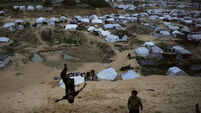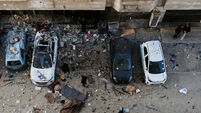Irish Examiner view: Satire dead as Trump makes peace

A heavily damaged building stands in a residential area a day after a direct missile strike, launched from Iran, following the announcement of a ceasefire, in Beersheba, Israel, on Wednesday Picture: Ariel Schalit/AP
The ceasefire between Israel and Iran appears to be holding at the time of writing, though the swiftness of unfolding events in the Middle East has often made a mockery of presumption in the past.
The two nations’ exchange of missiles was a worrying escalation in a region not short of hair-trigger tempers, so we should not belittle anyone who is seeking to calm the situation.
















